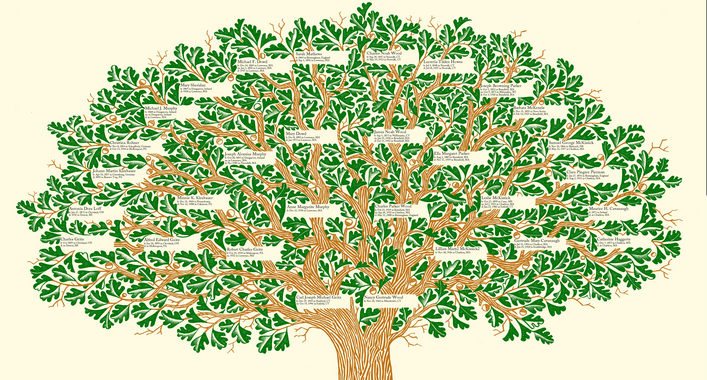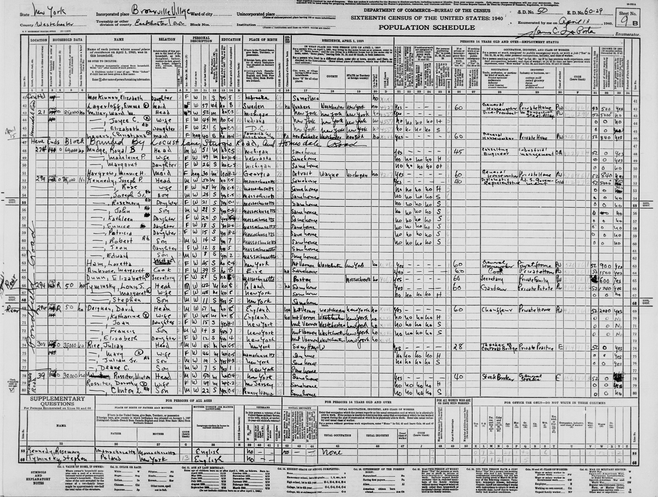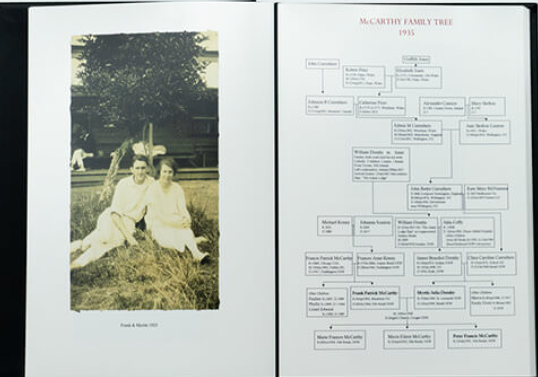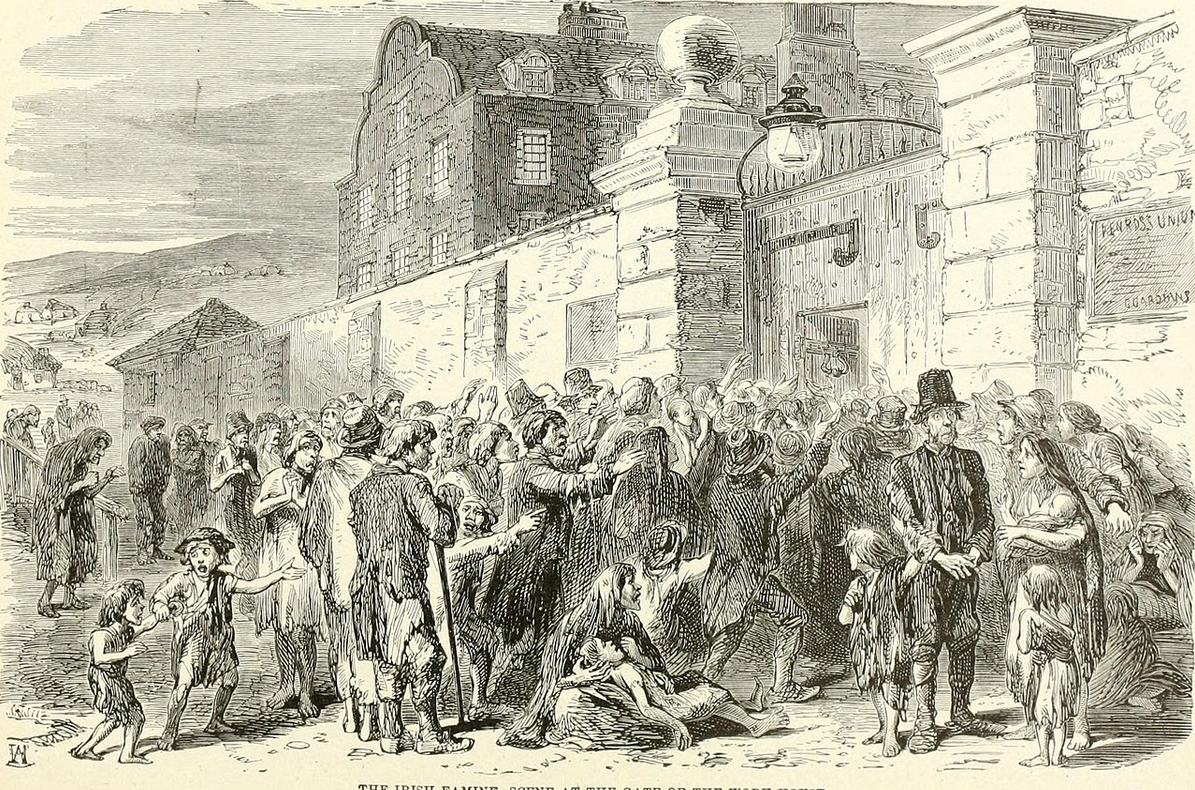What is Family History?
There is some confusion concerning the difference between genealogy and family history. Many may not realize that the two terms are not exactly the same as there is a difference. We will discuss this in more detail in this post and help you understand the two terms more clearly.
What Is Meant by Genealogy?
The study of genealogy pertains to the study of an individual's direct-line ancestors. This would include parents, grandparents, great grandparents etc. Essentially the provable line of descent going back in time as far as records will allow.

Genealogy's priority is the gathering of quantitative information such as dates and places that pertain to the life of our individual ancestors. It concentrates on records such as birth, death, marriage and censuses.
The result of this data collection type research is usually a pedigree chart with names, dates and locations. It gives a basic view of the individuals from whom a person descends based on where and when they lived and died.
How Is Family History Different?
Family history goes beyond the basics of genealogy into a broader scope of who our ancestors were. It is more than the dates and places it speaks to who our ancestors were and what they did in their day to day lives.
Studying our family history allows us as researchers to place the people we descend from in a social context. It also brings in family members who may not be direct-line ancestors and the influences they had on the family as a whole. As an example a famous great uncle or aunt may be discovered adding flavor to the family history.
It is a study that goes beyond the dates and may include things like exact addresses, movement patterns of the family, occupations and notable events in the lives of our ancestors. You may even learn something from the people who surrounded your family members, even those not related such as neighbors and co-workers.
Why Is Family History Important?
Basic genealogy with the dates and places is great. It's generally accurate and it connects us to the names of ancestors and where they come from. Family history however is far more, it gives us a perspective of who we come from and the actual history of our families.

We may find pictures of individuals we never met or discover stories of an ancestor who may have been a war hero or held an important occupation. The broader context of family history can also uncover mistakes in official documents which may change the family story.
Family History Can Be More Accurate Sometimes
Well researched genealogy will usually produce accurate results as it relies on official records that are provable. Sometimes however the official record can be incorrect and other methods of research may uncover the truth.
An example of this occurred in my own family. Official documents name my grandmother's father as a gentleman with the last name Taylor. Evidence from other records indicate that my grandmother's mother married this gentleman when she was 4-5 months pregnant with her. This does not preclude him as the father obviously, however DNA was yet to have its say.
Having taken the AncestryDNA test I discovered many cousins and was able to determine that I have recent connections to two men who lived in the same area my grandmother was born. It became evident based on shared DNA that these two individuals, a Mr. Jones and a Mr. Johnson was either my grandfather or my great grandfather respectively.
Using census records I was able to determine that Mr. Jones would have been 15 when my grandmother was conceived and did not live close to my great grandmother. Mr. Johnson however was a few years older than my great grandmother and lived next door to her.
It becomes evident that Mr. Taylor was not in fact the biological father of my grandmother despite being on her birth certificate. It was most likely Mr. Johnson and the mystery of my own mother's paternity was also answered as Mr. Jones had to actually be her father.
It should be noted that my mother was always told her father's name was Ron. But DNA however indicates that Mr. Jones, whose first name was not Ron, was in fact her father. So not only was the official record incorrect regarding her mother's father but family oral history was not correct pertaining to her own parentage.
Our Ancestors Sometimes Lied
When it came to official documents people were not always honest about the real facts. A father may be added to a birth record not knowing that another person was actually the biological parent. Places of birth may be misreported on census records as can nationalities.
For all the accuracy that records can be claimed to offer us there is an undeniable possibility the information contained in them may be accidentally or deliberately incorrect. Sometimes the stories told in the family may hint at the truth, DNA may change assumptions and indirect evidence may indicate a family secret.
Some Family History Task Ideas
For those who wish to expound on their family history by putting more context to the names and dates found in genealogical research, there are many ways to achieve this. In this section we will look at some ideas to try and find out more about our families and who they were.
Create a Family Narrative
Creating a document of your general findings about your ancestors can be both a rewarding and fun project. Gathering together the names and dates you discovered and combining them with family stories that pertain to those family members can help you write a family narrative.
These can vary in size from a few generations to a whole history of a family since arrival in a certain region. As an example a book exists that pertains to one of my wife’s ancestors which traces the family story back to the 1600s in America.

Another branch of my wife’s family created a small narrative tracing back to her great great grandparents and their arrival in the United States from Ireland. It contains images of tickets from their voyage, family pictures, stories and genealogical details about their descendants for several generations.
The process of writing a narrative can be complicated so we won't go into that here but the point is it can be a great way to explain your research to other family members. A written family history narrative can be shared in the family and teach them things they perhaps were not aware of in their family's history.
Research Why an Ancestor Emigrated
Millions of people in the US identify as having immigrant ancestry and may well be aware if their ancestors came from Ireland, Norway, Spain etc. Sometimes we may know why that first ancestor came to the US however this is not always the case.
Doing more research into where that ancestor came from and when they decided to leave may explain their motives in doing so. As an example if an ancestor was of Jewish descent and left a European nation around a time when political powers were persecuting people of that faith the reasoning becomes obvious.
This can also be the case with ancestors who leave a region suffering hardships, political unrest or outright civil war. The general reason for leaving for a new nation is the need to find a better life with improved opportunities.

The key to try and find out your ancestors' motives is to know when they left and what was happening in their homeland at that time. You may uncover that a war was raging or people of your ancestors' faith were being driven out. The answer may also be as simple as the profession your ancestor worked in was not paying well enough.
Search Your Ancestors in the News
Newspapers are a great resource for notable family history stories. You may be surprised to find out your ancestors made the news in various forms from birth/marriage/death announcements to human interests stories or even criminal activity.
I once discovered for a client that their ancestor had been involved in criminal activity and even discovered various aliases that their relatives used. It may surprise people that a search for their ancestor's name in local publications from the time they lived in an area may turn up some interesting stories.
Gather Family Photos
Finding family photos is a great way to help develop your understanding of your ancestors. Your own branch of the family may not have many images but cousins can be a great resource. As an example a 4th cousin I found through DNA had a picture of my great great grandparents that I had never seen.
Through DNA cousins you may find pictures and stories which shed light on your family history.
Final Thoughts
Family History is an extension of basic genealogy. It expands on the traditional names and dates concept to encompass who our ancestors were and what they looked like. It tells the stories of how they lived, loved and thrived in a different time.
Link To or Reference This Page
We spent a lot of time downloading, cleaning, merging, and formatting the data that is shown on the site.
If you found the data or information on this page useful in your research, please use the tool below to properly cite or reference Name Census as the source. We appreciate your support!
-
<a href="https://namecensus.com/blog/what-is-family-history/">What is Family History?</a>
-
"What is Family History?". NameCensus.com. Accessed on May 7, 2024. https://namecensus.com/blog/what-is-family-history/.
-
"What is Family History?". NameCensus.com, https://namecensus.com/blog/what-is-family-history/. Accessed 7 May, 2024
-
What is Family History?. NameCensus.com. Retrieved from https://namecensus.com/blog/what-is-family-history/.
